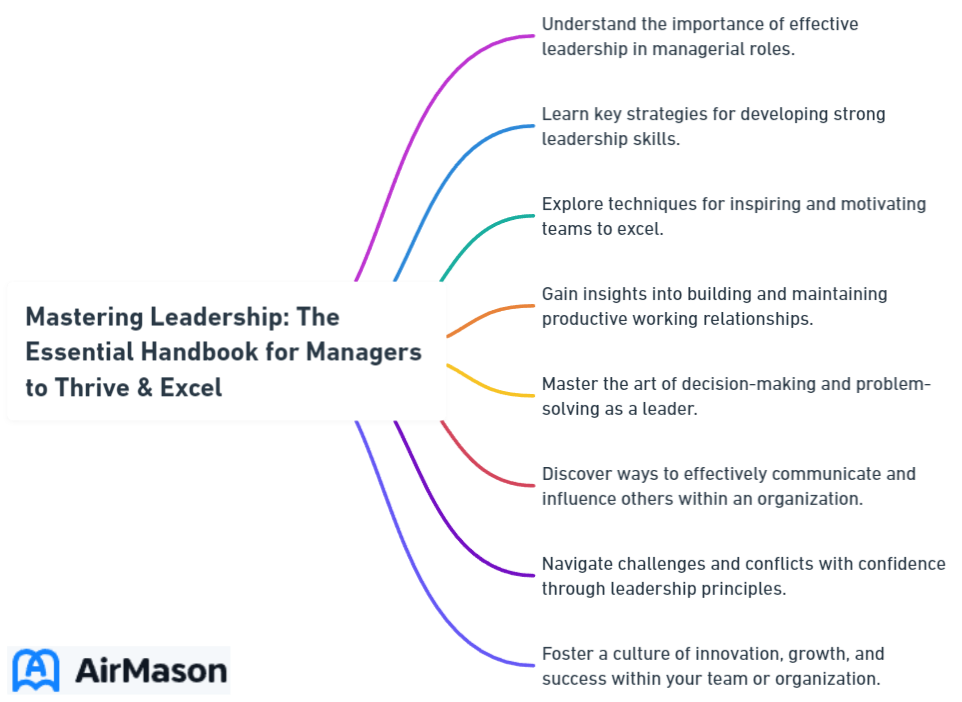
Unlock the essentials of management with this direct handbook for managers. From sharpening leadership skills to driving team performance, each section delivers concrete tips and actionable advice. Expect to find distilled wisdom for decision-making, time management, and team building, all designed to enhance your managerial approach. This handbook bypasses the generic advice, focusing instead on the specific challenges and solutions experienced managers need.
Key Takeaways
- Embrace the powerful toolkit within a manager’s handbook, perfecting leadership skills, and learn from seasoned business leaders to inspire innovation and growth in your team.
- Cultivate your unique management style by emphasizing adaptability, leveraging your strengths, and addressing areas for improvement to effectively navigate diverse team dynamics and situations.
- Boost team productivity and happiness by managing performance with a mix of clear communication, regular feedback, and fostering a positive work environment, while prioritizing personal and team growth.
Employee Handbook Compliance
Employee handbook compliance is crucial for maintaining a harmonious and legally sound work environment. Ensuring that employees adhere to the guidelines outlined in the handbook is essential for both the organization and its workforce. This document serves as a comprehensive guide, detailing company policies, procedures, and expectations. It covers a wide range of topics, including but not limited to, code of conduct, harassment policies, benefits, and disciplinary procedures. By following the guidelines set forth in the employee handbook, employees contribute to a positive workplace culture while also mitigating potential legal risks for the organization. Regular reviews and updates to the handbook are necessary to keep pace with evolving regulations and best practices in the industry.
The Manager’s Handbook: Key Components for Success

A manager’s handbook can be a powerful tool for success. Consider it an essential resource, providing you with necessary information, policies, and procedures to fulfill your role effectively. The manager’s handbook helps reveal the company values and culture, promoting adherence to them, helping you make informed decisions, and fostering consistency in leadership practices.
The key components of a Manager’s Handbook are:
- Company’s vision
- Values
- Culture
- Roles
- Responsibilities
- Performance management
- Communication guidelines
- Conflict resolution strategies
Imagine having a dozen business books, including some from Harvard Business School, condensed into one compact, easy-to-navigate “how to book” guide, filled with highly practical detail. That’s the power of a well-structured manager’s handbook.
Essential Skills
What are the skills that distinguish great leaders? These go beyond a fancy title or a well-decorated office. These are qualities such as:
- High emotional intelligence
- Clear communication
- An understanding of people’s needs
- A passion that inspires others
From active listening to problem-solving, self-confidence to humility, these five essential skills form the backbone of effective management. And the best part? Even weaknesses, such as a lack of delegation skills or emotional intelligence, can be improved with feedback and training.
Becoming a great manager requires more than just advancement in the corporate hierarchy. It’s about mastering these essential skills and applying them to lead with impact.

Business Leaders’ Insights
The path to successful leadership is often paved with tales of victories and valuable lessons. For instance, consider business leaders interested in expanding the company’s market share by expertly negotiating with partners, thanks to their strong communication skills. One such leader is a former executive vice president whose problem-solving skills led to a patented new product that revolutionized the market. Learning from other business leaders can also provide valuable insights for growth and success.
These stories show that mastering essential leadership skills can lead to substantial business growth, innovation, and resilience. Every stride in communication, every decision made in a crisis, and every innovative solution contributes to the larger picture of business success. It’s these real-life examples that make the journey of leadership so inspiring and rewarding.
Developing Your Management Style

Shaping a personal management style resembles the crafting of a unique masterpiece. It involves self-reflection to understand one’s natural tendencies, as well as recognizing strengths and areas for improvement.
Your approach to ambiguity in decision-making, your openness to change, or even your communication style can form a critical part of your management style. Sharing your management style helps in developing strong relationships by giving a better sense of your unique values, quirks, and growth areas. After all, being a great manager is not just about leading; it’s also about understanding and adapting.
Texas Employee Handbook Laws
Texas employee handbook laws govern the requirements and regulations that employers in the state must adhere to when creating and maintaining their employee handbooks. These laws outline the rights and responsibilities of both employers and employees, covering areas such as employment policies, discrimination and harassment policies, safety regulations, and employee benefits. Employers in Texas are required to ensure that their employee handbooks comply with state and federal laws, including those related to minimum wage, overtime pay, and workplace safety. It’s crucial for employers to stay updated on any changes to Texas employee handbook laws to ensure legal compliance and promote a positive work environment for their employees.
Strengths and Growth Areas
Every manager has strengths that make them shine, and great managers often possess some common strengths. These include:
- Effective listening
- Clear communication
- Taking initiative
- Constant pursuit of self-improvement
Recognizing these strengths and leveraging them is a crucial aspect of management.
However, growth is an ongoing process. Recognizing areas of improvement such as communication, delegation, and adaptability to change can help create a roadmap to success. Adopting a mindset of abundance and playful curiosity, reflecting on areas of improvement, and learning from mentors and experiences are strategies for leadership growth. Remember, even the greatest leaders are always learning.
Adapting to Different Situations
In the ever-changing realm of management, adaptability is paramount. Leaders should be able to shift between different leadership styles, based on the context and team characteristics. Some common leadership styles include:
- Directive
- Collaborative
- Autocratic
- Democratic
- Laissez-faire
- Transformational
By being adaptable and using the appropriate leadership style for each situation, leaders can effectively guide their teams to success.
Effective communication of leadership style to the team, including expectations, support, and evaluation criteria, is fundamental for building trust and alignment. After all, adapting to different situations is not just about changing your approach, but also about helping your team understand and navigate these changes.
Employee Performance: Addressing Issues and Enhancing Productivity

Employee performance is an integral element in the machinery of business success. As a manager, addressing employee performance issues and enhancing productivity are key aspects of your role. Whether it’s providing clear communication of expectations, precise job descriptions, or clear performance goals, every strategy you adopt impacts employee performance.
Providing support and resources, like flexible work arrangements or additional training, can help employees overcome challenges impacting their performance. Remember, managing employee performance is not just about achieving targets; it’s also about creating a positive work environment where employees can thrive.
Performance Reviews
Performance reviews go beyond being a routine HR process. They are a critical tool for setting clear expectations, providing ongoing feedback, and conducting thorough evaluations to support employee growth.
During performance reviews, it is essential to express positive intent, give specific observations, and invite employee responses. Regularly scheduled follow-ups after the performance review ensure ongoing feedback and help in recognizing patterns to adjust strategies or resources. Remember, effective performance reviews are a two-way street, fostering dialogue, understanding, and growth.
Employee Happiness
Happiness in the workplace has been linked to a 12% boost in productivity.. As managers, fostering a positive work environment, boosting engagement, and reducing turnover are critical responsibilities.
Whether it’s celebrating successes, providing flexible work schedules, or offering incentives such as:
- gym memberships
- team-building activities
- work-from-home options
- professional development opportunities
all these are essential for a tech company to thrive.
Every effort you make contributes to enhancing employee happiness. After all, happy employees are the backbone of a successful business.
Time Management and Decision-Making

Time is a precious resource. Effective time management involves implementing strategies like task prioritization, calendar management, and creating individual systems that enable better visualization and management of tasks.
Coupled with time management is the skill of decision-making. Reflecting on past mistakes, focusing on present evidence, and being decisive in a timely manner can make your decision-making prowess a game-changer in business success. An economics and business degree can provide you with the foundation to develop these essential skills.
Prioritizing Tasks
Amid the frenzied pace of management, task prioritization can be a game-changer. It helps managers focus on high-value activities, avoiding getting overwhelmed by less important ones.
Using tools like the Eisenhower Matrix or the ABCDE method, setting SMART goals and realistic deadlines ensures that tasks are aligned with time management and organizational needs. Remember, prioritizing tasks is not just about ticking off items on a to-do list; it’s about focusing on what truly matters.
Effective Decision-Making
Decision-making embodies an art form. Developing an eye for risk and understanding the indicators of wrong decisions enables managers to anticipate and mitigate potential pitfalls effectively.
Ensuring objectivity in evidence gathering by being honest about one’s motivations leads to more reliable and optimal decision outcomes. After all, every decision you make is a stepping stone towards business success.
Building and Nurturing High-Performing Teams

One of your fundamental roles as a manager is to cultivate high-performing teams. Different leadership styles have varying impacts on team performance, from democratic leadership fostering trust and collaboration to transformational leadership inspiring a shared vision and mission.
Defining clear objectives and goals is critical for team productivity and ensuring that everyone is aligned with what’s expected. Remember, building and nurturing high-performing teams is not just about achieving targets; it’s about creating a culture of collaboration and mutual growth.
Onboarding and Training
Onboarding forms your team’s initial perception of your leadership. An effective onboarding process significantly increases the chance of retaining employees for at least three years.
But it doesn’t end there. Providing relevant training and development opportunities is crucial for employee contentment and their professional growth within the company. Remember, investing in your team’s growth is investing in your company’s future.
Inspiring Loyalty and Trust
Successful leadership is anchored in trust and loyalty. Trust in leadership is established by keeping commitments and recognizing when overcommitment has occurred to avoid loss of trust through failure to honor promises.
Maintaining loyalty during organizational changes is achieved by removing uncertainty and communicating transparently with employees. Remember, inspiring loyalty and trust is not just about leading; it’s about standing by your team through thick and thin.
The Role of Human Resources in Managerial Success
Human resources serve as a vital ally in your path to managerial success. Seeking support from HR professionals is necessary to effectively tackle complex performance issues.
Whether it’s establishing the underlying issues of poor performance or encouraging managers to try informal approaches to resolving performance issues, HR plays a crucial role in supporting managerial success. Remember, HR is not just a department; it’s a resource that can help you become a better leader.
Performance Feedback
Performance feedback can steer you towards improved management. HR helps managers establish the underlying issues of poor performance by gathering evidence and discussing specific instances with them.
Regular performance feedback, which includes both positive acknowledgements and specific areas for improvement, is essential for managing employee performance. Remember, feedback is not just about pointing out mistakes; it’s about fostering growth through constructive critique.
Employee Development
Employee development reflects your dedication to your team’s growth. Providing relevant training and development opportunities not only fosters employee contentment but also their professional growth and retention within the company.
HR promotes a positive approach to performance conversations, encouraging managers to focus on and expand employee strengths, leading to better job design, and personal growth opportunities. Remember, investing in your employees’ development is a testament to your company’s commitment to their growth, which can in turn foster loyalty.
Employee Handbook Purpose
The purpose of an employee handbook is to serve as a comprehensive guide outlining the expectations, policies, and procedures that govern the employer-employee relationship within an organization. Employee Handbook Purpose is designed to communicate important information about company culture, values, and guidelines to employees, ensuring clarity and consistency in workplace practices. Additionally, the employee handbook serves as a valuable resource for new hires, helping them understand their rights and responsibilities from the outset. By clearly defining expectations and providing guidance on various workplace matters, the employee handbook plays a crucial role in promoting transparency, fairness, and compliance within the organization.
Summary
In conclusion, mastering leadership is a journey that involves honing essential skills, developing a personal management style, effectively addressing employee performance issues, managing time wisely, building and nurturing high-performing teams, and leveraging the support of human resources. As managers, your role extends beyond achieving business targets. It’s about inspiring your team, fostering a positive work culture, and paving the way for business success.
Frequently Asked Questions
What should be in a managers handbook?
A manager’s handbook should include guidelines for effective communication, collaboration, conflict resolution, and strategies for maintaining team morale, fostering a positive work environment and better teamwork.
What is the purpose of the manager’s handbook?
The purpose of the manager’s handbook is to serve as a comprehensive guide and reference for managers, providing them with the necessary information, policies, procedures, and best practices to effectively fulfill their roles and responsibilities.
How do I become a manager for the first time?
To become a manager for the first time, acknowledge that relationships have changed, start delegating, find a mentor, be consistent, and focus on goals rather than details. Seek out education, lead a project, mentor a teammate, support your supervisor, revise your resume, explore internal opportunities, consider assistant manager roles, and prepare for interviews.
How important are essential skills in leadership?
Essential skills like emotional intelligence, clear communication, and understanding people’s needs are crucial for effective leadership. Developing these skills can greatly improve one’s ability to lead and inspire others.
How can managers address employee performance issues?
Managers can address performance issues by providing clear communication of expectations, precise job descriptions, clear performance goals, and providing support and resources. It’s important to create a supportive environment for employees to thrive.
Important Disclaimer:
Please be aware that the content on this page has been generated by using artificial intelligence language models and may contain errors, inconsistencies, or outdated information. It is provided as-is without any warranties or guarantees of accuracy.
We strongly recommend using this content as a starting point for further research. We disclaim any liability for damages or losses resulting from the use or reliance on this content.